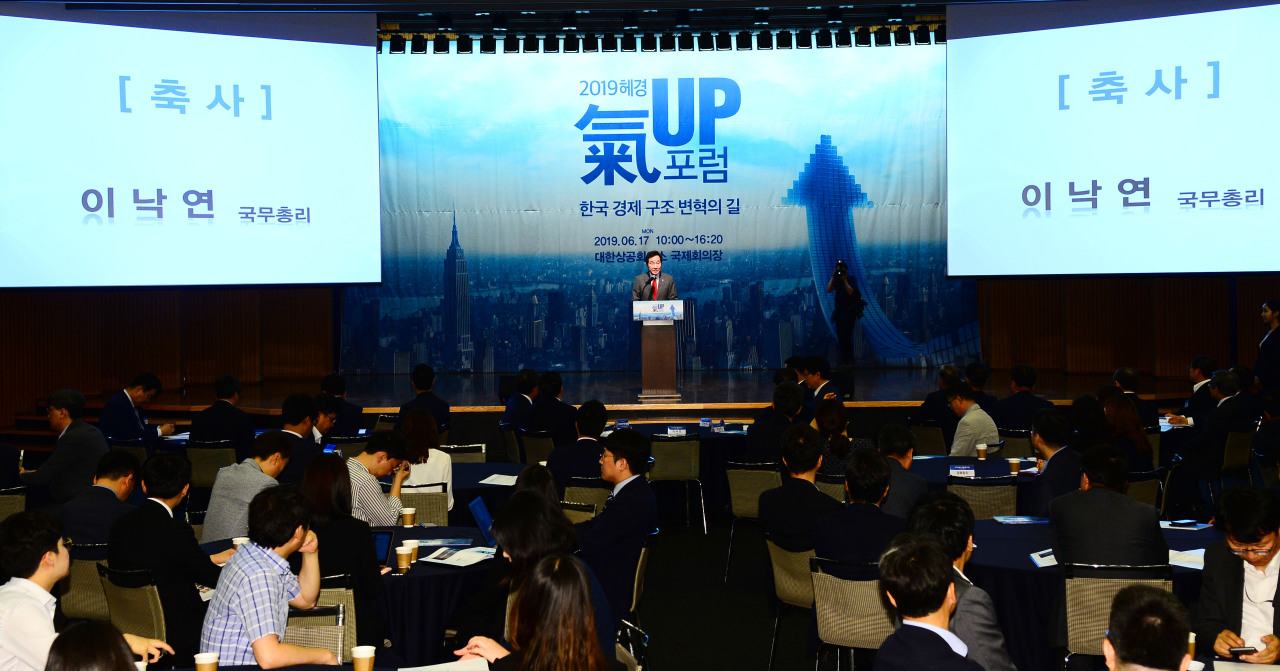Herald forum calls for ‘manufacturing renaissance’ innovation
By Lim Jeong-yeoPublished : June 17, 2019 - 15:32
The 2019 Herald Business 氣 UP Forum on Monday called for bold innovations in the manufacturing and service sectors, and business buoyance through the governmental regulatory sandbox.
South Korean Prime Minister Lee Nak-yeon and Herald Corp. CEO Kwon Chung-won gave welcoming remarks at the forum that was held at the Korea Chamber of Commerce and Industry.
This is the third year the Herald Business, a Korea Herald sister company, is holding the 氣 UP Forum. The name is a play on words that constructs the Korean word “gi-eop” meaning companies, by combining a Chinese character for power 氣 (gi), and English word “up.”
South Korean Prime Minister Lee Nak-yeon and Herald Corp. CEO Kwon Chung-won gave welcoming remarks at the forum that was held at the Korea Chamber of Commerce and Industry.
This is the third year the Herald Business, a Korea Herald sister company, is holding the 氣 UP Forum. The name is a play on words that constructs the Korean word “gi-eop” meaning companies, by combining a Chinese character for power 氣 (gi), and English word “up.”

“This is a forum that views the relationship between the government and businesses in three-dimensional light, for Korean economy’s structural innovation,” Kwon said.
“The traditional model of Korea’s economic growth is losing competitiveness,” he said, “While the whole world is reshaping for the new era of industrial spurt, Korea is yet to shift from the businesses that towed the nation two decades ago.”
Kwon brought up the faded founding philosophies at major conglomerates and the trade war between the US and China as hurdles to Korea’s future economic growth.
Lee urged for bold business investments in new technologies.
“The government will answer (such efforts from businesses) with supportive programs,” he said.
“New government strategies for renaissance of the manufacturing sector and the service sector will soon be announced,” Lee said, adding that they will be palpable for those working at the business frontlines. The number of regulatory sandboxes, aimed at easing regulations for specific business sectors, will surpass 100 this year, Lee said.
Bio-health and cultural contents are the future engines that the government is giving keen attention to.
Lee stressed on the five tasks for Korean economy’s structural reforms: new technologies for the manufacturing sector, development of the service sector, regulatory sandboxes, diversification of trade partners and products, and fostering art and culture.
“For us to cross this river of painful economic stagnation, industries and the government must collaborate to fulfil the structural reforms of businesses,” Lee said, urging companies to lead the way, to which the government will follow with bolder responses.
The day-long forum included sessions by top officials from various industries.
National Economic Advisory Council’s Vice Chair Lee Jay-min delivered a keynote speech on the past, present and future of Korea’s economic growth.
The morning sessions included Posco Research Institute CEO Jang Yoon-jong’s analysis of the Korean manufacturing businesses’ current crisis, Korea Startup Forum Executive Board Director Choi Sung-jin’s talk on regulations that obstruct budding industries and a panel discussion on solutions to attaining industrial competitiveness.
The afternoon sessions included talks on how to manage a business group in the era of low birthrates by professor Lee Sam-sik of Hanyang University’s Institute of Aging Society and an overview of the development and future of renewable energy and new energy businesses by Korea Energy Agency’s Renewable Energy Center’s head Lee Sang-hoon. There was also a talk on the shuttered nuclear plants, and the nuclear ecosystem on the verge of destruction by professor Hwang Joo-ho of Kyunghee University’s nuclear physics department. A panel discussion on the methods of energy changeover capped the forum.
By Lim Jeong-yeo (kaylalim@heraldcorp.com)



![[AtoZ into Korean mind] Humor in Korea: Navigating the line between what's funny and not](http://res.heraldm.com/phpwas/restmb_idxmake.php?idx=644&simg=/content/image/2024/04/22/20240422050642_0.jpg&u=)
![[Exclusive] Korean military set to ban iPhones over 'security' concerns](http://res.heraldm.com/phpwas/restmb_idxmake.php?idx=644&simg=/content/image/2024/04/23/20240423050599_0.jpg&u=20240423183955)



![[Graphic News] 77% of young Koreans still financially dependent](http://res.heraldm.com/phpwas/restmb_idxmake.php?idx=644&simg=/content/image/2024/04/22/20240422050762_0.gif&u=)
![[Herald Interview] Why Toss invited hackers to penetrate its system](http://res.heraldm.com/phpwas/restmb_idxmake.php?idx=644&simg=/content/image/2024/04/22/20240422050569_0.jpg&u=20240422150649)





![[Exclusive] Korean military to ban iPhones over security issues](http://res.heraldm.com/phpwas/restmb_idxmake.php?idx=652&simg=/content/image/2024/04/23/20240423050599_0.jpg&u=20240423183955)



![[Today’s K-pop] Ateez confirms US tour details](http://res.heraldm.com/phpwas/restmb_idxmake.php?idx=642&simg=/content/image/2024/04/23/20240423050700_0.jpg&u=)